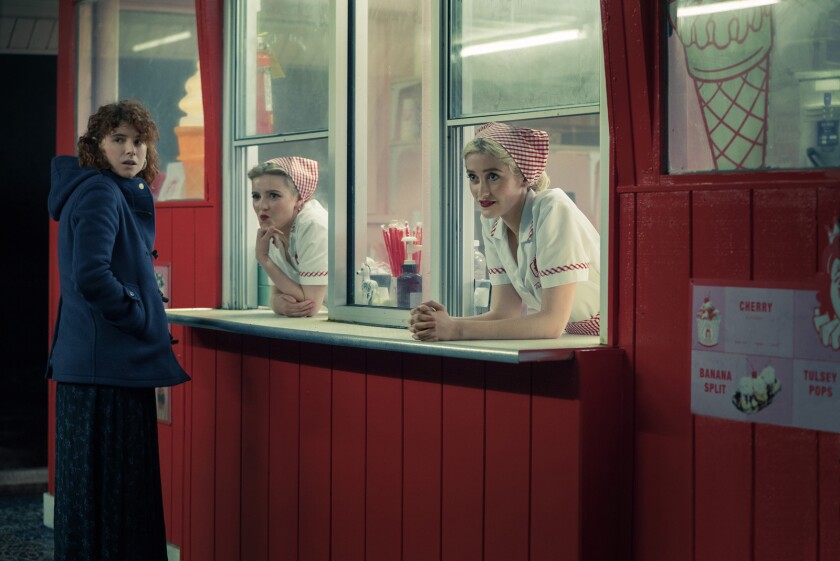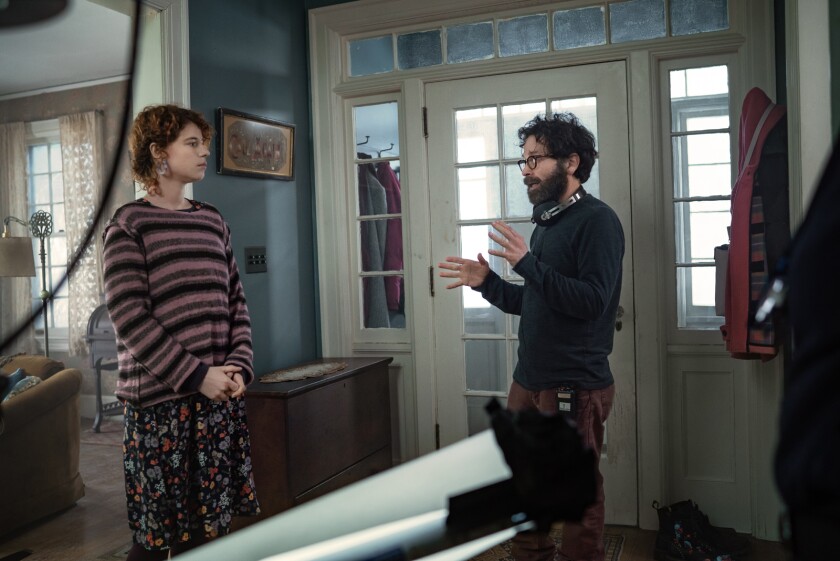If you just finished watching the new Netflix psychological thriller “I’m Thinking of Ending Things,” chances are you have a lot of questions. You may be perplexed, disturbed, exhilarated or all of the above. On a basic level, you may be wondering, “What was that?”
Rest assured, you’re not alone. You’re supposed to feel that way. That’s how you know it’s a Charlie Kaufman movie.
Adapted from a 2016 novel by Canadian author Iain Reid, “I’m Thinking of Ending Things” begins from an utterly simple, even mundane premise: A young couple (Jesse Plemons and Jessie Buckley) takes a road trip through a snowstorm to visit the boyfriend’s parents (Toni Collette and David Thewlis) at their family farm. But where the story goes from there — and where it ends up — involves a whole other kind of journey.
“I’m Thinking of Ending Things” bears all of the thematic obsessions and formal daring of Kaufman’s previous work as a screenwriter and director in mind-bending films such as “Being John Malkovich,” “Adaptation” and “Synecdoche, New York.” Characters trapped in the labyrinths of their own psyches. Explorations of regret, failure and loneliness. Fantasies, projections, memories and delusions. Surrealistic storytelling that bends back in on itself like an M.C. Escher painting. Heady stuff in every sense of the word.
Even the cast members are still pondering the enigmas and deeper meanings of the film, which Kaufman purposefully designed to reward repeat viewings. “I know what it meant to me while we were shooting, but it was a different experience watching it,” says Jesse Plemons, who plays the boyfriend, Jake. “It was really unsettling to watch. It’s still mysterious.”
“In truth, it’s about so many deep, human experiences and emotions that it can be whatever you want it to be,” says Collette, who plays Jake’s mother. “It doesn’t manipulate the audience. And Charlie likes it that way. … It’s just story upon story upon story, just beautifully complex. There is a simple narrative to cling to and then there is what it is really about.”
Indeed, there’s a lot to unpack in the film — too much, frankly, for one article. But here is some of what you may have missed.
Warning: Major spoilers ahead. If you haven’t seen “I’m Thinking of Ending Things,” we suggest reading this review or this story about the making of the film, then come back.
Kaufman’s film concludes with a revelation: Everything we have seen, from start to finish, has essentially been the mental projection of a lonely old high school janitor who has failed to live up to the dreams of romantic and academic glory he had as a young man. Jake’s girlfriend was never actually his girlfriend, just an idealized version of someone he briefly encountered one night at a bar but didn’t have the guts to pursue — or maybe an amalgam of all the “ones that got away.” The whole road trip has been a journey through Jake’s memories, unfulfilled wishes, obsessions and regrets. The story ends, tragically, with the janitor’s suicide, revealing the double meaning in the film’s very title.
All of this is made much more explicit in Reid’s original book, with the voice of the girlfriend (who is never named) fusing with that of the janitor in the final pages, as he/she stabs him/herself in the neck with a wire hanger. Kaufman handles the conclusion more elliptically, with a dance sequence (one of many references to the musical “Oklahoma!”) that essentially acts out the sad life of a man who has metaphorically killed his promising young self and a fantasy sequence in which Jake accepts the Nobel Prize.

Buckley’s girlfriend visits the fictional Tulsey Town in a scene from “I’m Thinking of Ending Things.”
(Mary Cybulski/Netflix)
In writing the book, Reid says he saw it more as a literary character study than some nail-biter with a twist ending. Likewise, Kaufman says he never cared about delivering a head-snapping M. Night Shyamalan-style turn at the end, nor did he see himself as making a thriller per se.
“I’m not interested in twists in movies,” he says flatly. “I don’t think I was particularly interested in maintaining suspense. I felt like it was kind of for me a fool’s errand to make that the point of the movie. So I tried to reframe it in my mind as a character exploration of a relationship, with the ideas of memory and projection and loneliness and isolation as the things that move you through the story.”
Indeed, as Kaufman points out, the it-was-all-a-dream gimmick is pretty old hat anyway: “That particular twist in movies is not much of a twist at this point. It’s been done, so therefore you’re looking for it as an audience.”
The fact is, if you go back and watch the movie a second time, you’ll realize that the clues were there in plain sight from the start. In the film’s opening moments, we see the janitor looking out the window at the young woman. As she speaks in voice-over of her “rare and intense attachment” to her boyfriend, we see first the back of an old man and then the back of Plemons as Jake. Coming so early in the story, that dead giveaway likely goes straight over the head of most viewers but Kaufman isn’t exactly trying to hide it.
As Jake and his girlfriend drive to his parents’ house, their strange, meandering conversation contains numerous clues that things are not at all what they seem, with virtually every line a piece of a larger puzzle. The girlfriend’s name changes several times, as does her supposed academic field of study, suggesting that she may be less a flesh-and-blood woman than a hazily reconstructed memory of one. At one point, Jake references Wordsworth’s poem “Intimations of Immortality From Recollections of Childhood,” an exploration of aging and the faded glories of youth.
At the family farm, things get even more surreal. Jake’s parents shift ages several times, suggesting again that we are in some strange and slippery world of memory and fantasy rather than observing actual events. Jake’s girlfriend receives a number of foreboding phone messages that echo the words we heard the first time we saw the janitor in the window (“I can feel my fear growing. Now is the time for the answer.”). In the washing machine in the basement, she finds what is later revealed to be the janitor’s uniform, reinforcing the idea that the basement itself is a kind of metaphor for the part of Jake’s mind where he hides his deepest shame.
As strangely shapeshifting as the scenes at the parents’ house were as scripted, Collette says Kaufman helped the cast stay locked into the deeper meaning. “The thing that helped me click into it the most was when Charlie said, ‘It’s like the characters are all part of the same mind,’ ” she says. “It really helped to define what to lean into, the very rhythm of it and how it swung around between the four of us.”

Kaufman directing Buckley on the set of “I’m Thinking of Ending Things.”
(Mary Cybulski/Netflix)
For Buckley, playing a character whose very identity is conjured out of Jake’s idealized fantasies was a difficult but thrilling challenge. Before shooting began, the actress spent hours sharing bits of inspiration back and forth with Kaufman, including paintings and poetry. “Charlie was so incredible about preparing how you might approach being somebody who doesn’t exist at all,” she says. “It was the most vulnerable and exposing place to stand in but also the most liberating.”
In Jake’s childhood bedroom, the camera pans at one point across a number of books, DVDs and artworks that are later revealed to be totems of his memory, references to which are sprinkled throughout the film. For example, when Jake and the girlfriend begin speaking, seemingly out of nowhere, about the 1974 John Cassavetes drama “A Woman Under the Influence,” her take on the film quotes directly from a review of the film by Pauline Kael, whose collected reviews were on Jake’s shelf (though not the same collection that contains that review). Jake’s fantasy Nobel Prize acceptance speech at the end quotes verbatim from the one given by mathematician and economist John Nash, whose struggle with schizophrenia was chronicled in the film “A Beautiful Mind” — one of the DVDs on Jake’s shelf.
At the Tulsey Town ice cream stand where Jake and his girlfriend later make an impromptu stop — which has the dreamlike, old-timey feel of a place lodged deep in one’s memory — attentive viewers may notice that the teenage employees were fleetingly seen earlier as students at the school where the janitor works.
For Plemons, a big part of the job of playing Jake was connecting all the various dots on the map of the character’s psyche that Kaufman constructed. “There was a lot of reading because there were an infinite number of references,” he says. “It was interesting to figure out what these pieces were all leading up to.”
There are many more such Easter eggs and metaphysical rabbit holes throughout the film, but we don’t want to spoil all the fun of finding them. (Tip: On a second viewing, you might want to use the pause button on your remote and be ready to do some Googling.) From the outset, Kaufman carefully crafted the film to repay close attention. “I like reading different interpretations of the things that I do,” he says. “It is part of my goal to allow for that and to give people something that can resonate with them.”
In the end, while “I’m Thinking of Ending Things” may contain some of the trappings of a conventional horror film — ominous music, scratches on the door to a basement no one ever enters, creepy voicemail messages from the beyond — those are just tropes that Kaufman is toying with. What he has really created is something far richer than your typical Hollywood fright fest, and it is ultimately up to you to supply the existential scares from your own mind and experience.
“In a way, it is a psychological horror film — it’s just not a genre film,” Kaufman says. “It’s about the horror of different elements of the human psyche, of human life.”
Entertainment - Latest - Google News
September 05, 2020 at 09:00AM
https://ift.tt/3338WLo
'I'm Thinking of Ending Things' explained: Netflix's prairie noir - Los Angeles Times
Entertainment - Latest - Google News
https://ift.tt/2RiDqlG
Shoes Man Tutorial
Pos News Update
Meme Update
Korean Entertainment News
Japan News Update
Bagikan Berita Ini














0 Response to "'I'm Thinking of Ending Things' explained: Netflix's prairie noir - Los Angeles Times"
Post a Comment